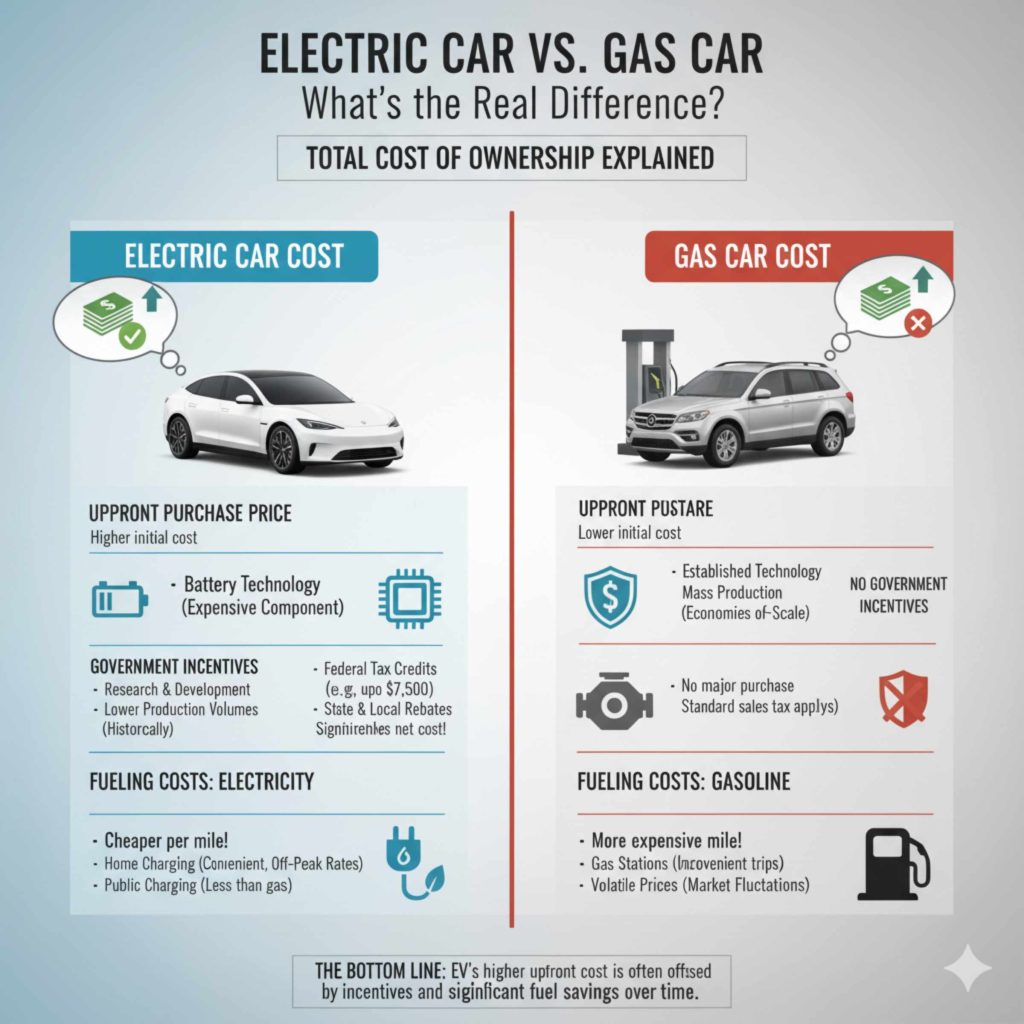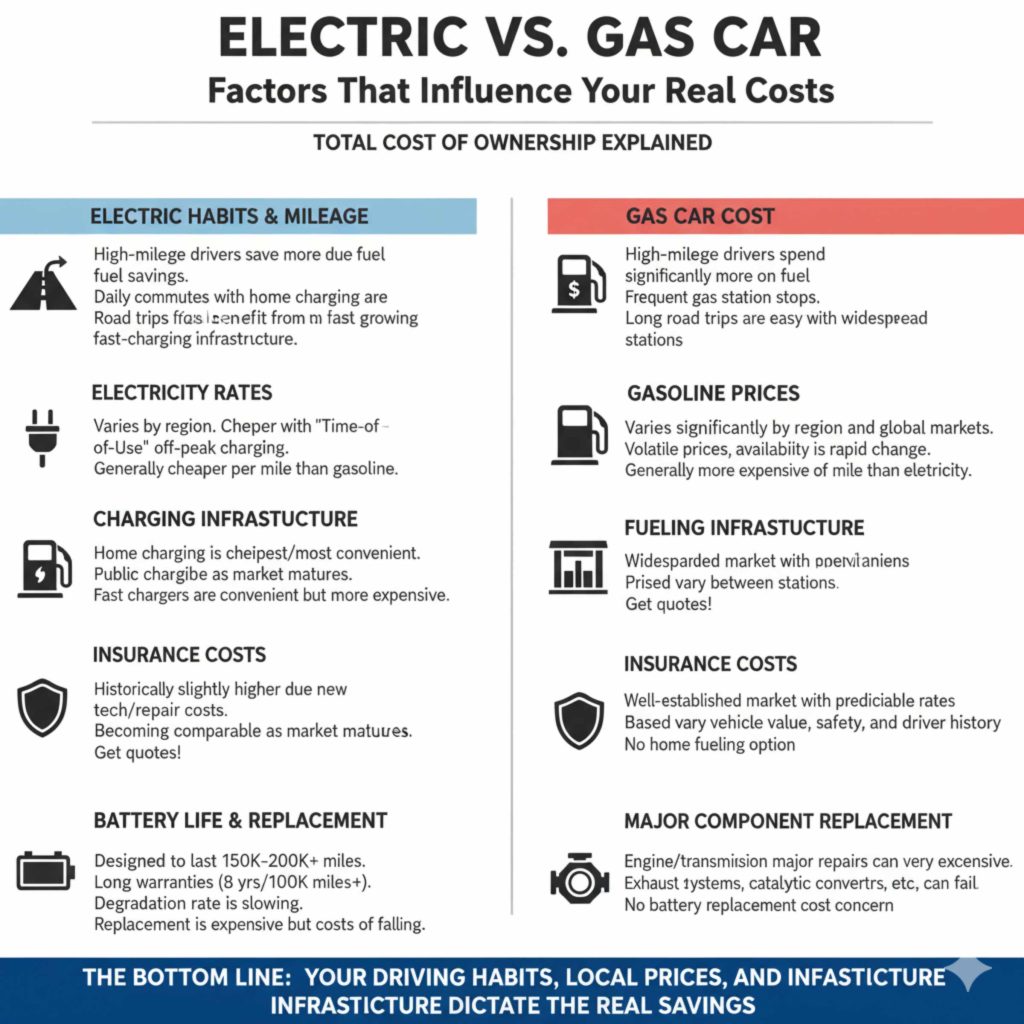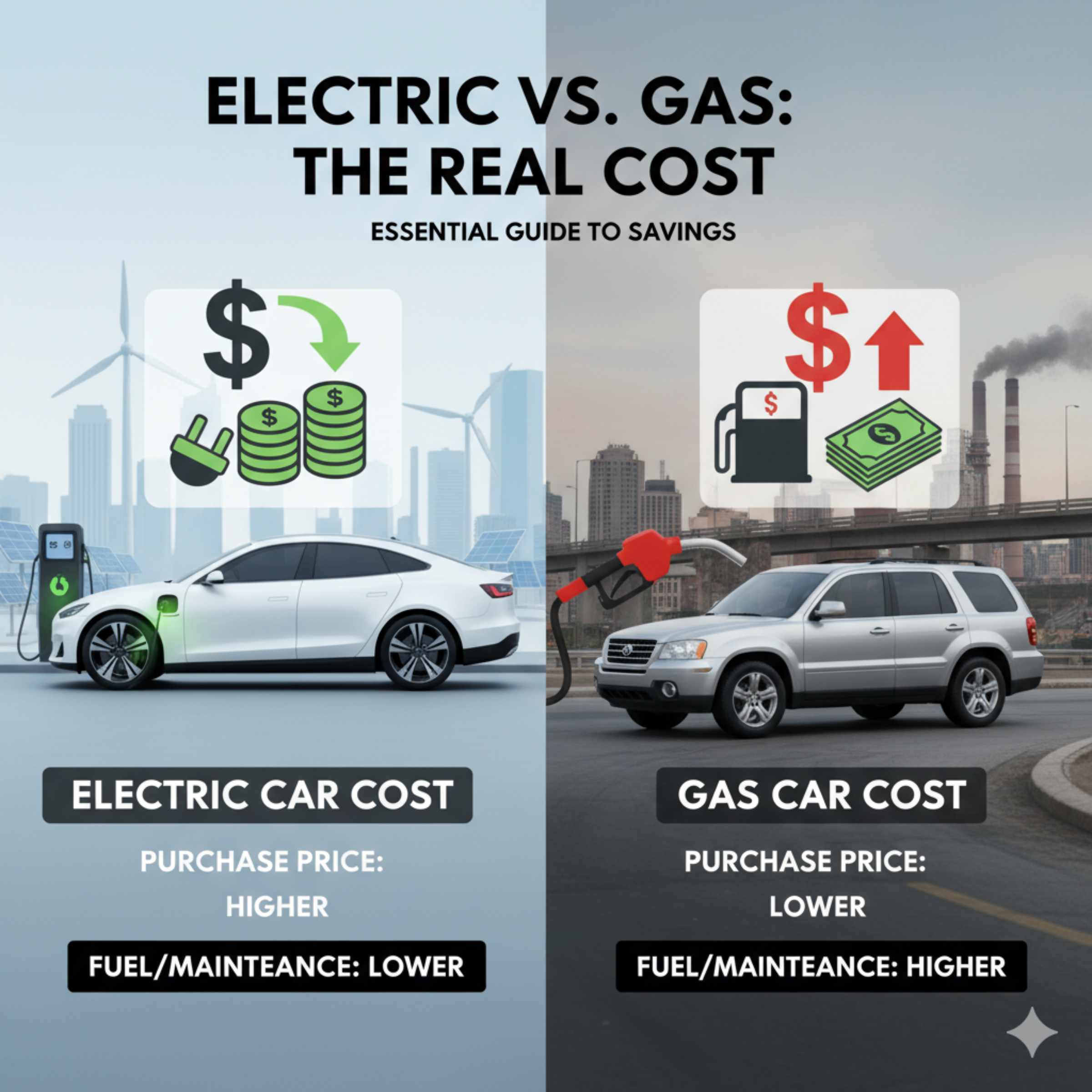Quick Summary
An electric car typically has a higher upfront purchase price than a comparable gasoline car, but its total cost of ownership can be significantly lower due to cheaper fueling (electricity vs. gas) and reduced maintenance needs. The long-term savings often outweigh the initial investment.
So, you’re wondering about the cost of electric cars versus gas cars, right? It’s a common question, and honestly, it can feel a bit confusing with all the numbers out there. But don’t worry, I’m here to help you break it down in a way that makes sense. We’ll look at the sticker price, how much you’ll spend on “fuel,” and what it takes to keep them running. By the end, you’ll feel much more confident about figuring out what works best for your wallet and your driving habits. Let’s get started!
Electric Car Cost vs. Gas Car: What’s the Real Difference?
When we talk about the cost difference between electric cars (EVs) and their gasoline counterparts, it’s not just about the price you see on the dealer’s window sticker. That’s just the first piece of the puzzle. To truly understand the value, we need to look at the entire picture – what you pay upfront, what you pay to drive, and what you pay to maintain the vehicle over time. This is often called the “total cost of ownership.”
The Upfront Purchase Price
Generally, electric cars tend to have a higher initial purchase price than similar gasoline-powered vehicles. This can be a bit of a hurdle for some buyers. Several factors contribute to this:
- Battery Technology: The battery pack is the most expensive component of an EV. Developing and manufacturing these advanced batteries comes with significant costs.
- Research and Development: Automakers are investing heavily in new EV technology, and these costs are often reflected in the vehicle’s price.
- Lower Production Volumes (Historically): While production is ramping up, EVs haven’t historically been produced in the same massive numbers as gasoline cars, which can affect economies of scale.
However, it’s important to remember that this initial price gap is shrinking year by year as technology improves and production scales up. Plus, there are often government incentives and tax credits designed to make EVs more affordable.
Government Incentives and Tax Credits
To encourage the adoption of cleaner transportation, many governments offer financial incentives. These can significantly reduce the net cost of buying an electric car.
- Federal Tax Credits: In the United States, the federal government offers tax credits for qualifying new and used electric vehicles. These credits can range from a few thousand dollars up to several thousand, depending on the vehicle’s battery capacity and where it’s manufactured. The rules can change, so it’s always a good idea to check the latest information from the U.S. Department of Energy.
- State and Local Rebates: Many states, cities, and even utility companies offer additional rebates, tax exemptions, or grants for EV purchases. These can provide further savings.
Always research the incentives available in your specific location before making a purchase. These incentives can often bring the upfront cost of an EV much closer to, or even below, that of a comparable gasoline car.
Fueling Costs: Electricity vs. Gasoline
This is where electric cars start to shine when it comes to saving money. The cost of powering an EV with electricity is almost always cheaper than fueling a gasoline car with petrol. Let’s break down why:
- Price per “Mile”: Electricity generally costs less per mile driven than gasoline. While electricity prices can fluctuate, they typically offer more miles for your dollar.
- Home Charging Convenience: The biggest advantage is charging at home. You can plug in your EV overnight and wake up to a “full tank” without a trip to the gas station. This convenience also means you can often take advantage of lower off-peak electricity rates.
- Public Charging: Public charging stations come in different speeds and pricing structures. While some can be more expensive than home charging, they still often compare favorably to gasoline, especially for longer trips.

To give you a clearer picture, let’s look at an example. Imagine driving 15,000 miles per year.
| Cost Component | Gasoline Car (Example) | Electric Car (Example) |
|---|---|---|
| Average Miles Per Gallon/kWh | 30 MPG | 3 miles/kWh |
| Average Fuel Cost (Gallon/kWh) | $3.50/gallon | $0.15/kWh (home charging) |
| Annual Fuel Cost (15,000 miles) |
$3.50/gallon (15,000 miles / 30 MPG) = $1,750 |
$0.15/kWh (15,000 miles / 3 miles/kWh) = $750 |
As you can see in this example, the annual fuel savings for the electric car are substantial. This saving adds up significantly over the lifespan of the vehicle.
Maintenance and Repair Costs
Another area where EVs typically have an advantage is maintenance. Gas cars have many moving parts that require regular attention, while EVs are much simpler mechanically.
What EVs typically DO NOT need:
- Oil changes
- Spark plug replacements
- Exhaust system repairs (muffler, catalytic converter)
- Transmission fluid changes
- Timing belts
EVs have far fewer fluids to manage (coolant for the battery and motor, and windshield washer fluid) and fewer parts that wear out. The primary wear items are usually tires and brakes. While brakes are also on gasoline cars, EVs often benefit from “regenerative braking.” This system uses the electric motor to slow the car down, capturing energy and sending it back to the battery. This means the traditional friction brakes are used less often, leading to longer pad and rotor life.
What EVs DO need:
- Tire rotation and replacement
- Cabin air filter replacement
- Brake fluid checks
- Wiper blade replacement
- Coolant checks (infrequently)
While EVs might have some unique components that could require specialized attention, the reduced need for routine maintenance translates to lower costs and fewer trips to the service center. According to studies, the average annual maintenance cost for an EV is often lower than for a comparable gasoline car. For instance, Consumer Reports found that EVs cost less to maintain and repair over their lifetime than comparable gas cars.
Resale Value
The resale value of electric cars has historically been a point of discussion. For a long time, there was concern that battery degradation or rapidly changing technology would lead to lower resale prices. However, the market is evolving, and many factors are now supporting strong EV resale values:
- Growing Demand: As more people become aware of the benefits of EVs, demand for used models is increasing.
- Battery Longevity: Modern EV batteries are designed to last for many years and miles, often coming with long warranties (e.g., 8 years or 100,000 miles).
- Continuous Improvement: While technology advances, the core reliability of EVs is proving to be excellent.
While it’s always smart to research the projected resale value of any specific model you’re considering, the fear of poor EV resale value is becoming less of an issue compared to the past.
Factors That Influence EV vs. Gas Car Costs
Beyond the general comparisons, several other factors can sway the cost balance between electric and gasoline vehicles. Your personal circumstances play a big role.
Driving Habits and Mileage
How much you drive is a huge factor. If you’re a high-mileage driver, the fuel savings of an EV will accumulate much faster, making the higher upfront cost easier to recoup over time. For someone who drives very little, the payback period might be longer.
Consider your daily commute and typical road trips. If your daily driving is well within an EV’s range and you typically charge at home, the convenience and cost savings are maximized. For long, frequent road trips in areas with limited charging infrastructure, a gasoline car might still be more practical for now, but this is changing rapidly.
Electricity Rates and Gasoline Prices
The cost difference is directly tied to the price of electricity versus gasoline in your area. If you live somewhere with very cheap gas prices and high electricity rates, the advantage for EVs might be less pronounced. Conversely, areas with high gas prices and relatively affordable electricity will see greater savings with an EV.
It’s also worth checking if your electricity provider offers special “time-of-use” rates. If you can charge your EV overnight during off-peak hours, you can significantly reduce your “fueling” costs.
Charging Infrastructure Availability
While home charging is the most economical, the availability of public charging can influence your decision, especially if you live in an apartment or don’t have off-street parking. Fast public chargers can be convenient for road trips but often cost more per kilowatt-hour (kWh) than home charging.
Access to reliable and affordable charging is still developing in some areas. If charging is a significant concern, research the public charging stations in your regular routes and destinations.
Insurance Costs
Insurance premiums can vary for EVs and gasoline cars. Historically, some EVs have had slightly higher insurance premiums, often due to higher repair costs for specialized parts or the higher initial purchase price. However, this is also leveling out as more EVs are on the road and repair networks mature.
It’s always a good idea to get insurance quotes for specific EV and gasoline models you’re considering to compare costs accurately.
The Cost of Batteries
The EV battery is a critical component, and its eventual replacement can be a significant expense. However, battery technology is improving rapidly:
- Lifespan: Most EV batteries are designed to last the life of the vehicle, often exceeding 150,000 to 200,000 miles.
- Warranties: Manufacturers typically provide long warranties on batteries (often 8 years/100,000 miles or more), covering defects and significant capacity loss.
- Degradation: While batteries do degrade over time, the rate of degradation has slowed considerably with newer technologies, meaning they retain a good portion of their capacity for many years.
- Replacement Costs: Should a battery need replacement outside of warranty, it can be expensive, but costs are decreasing as manufacturing scales up. Some initiatives are also looking into battery refurbishment and recycling programs to reduce costs further.
While it’s a factor to consider for very long-term ownership (beyond warranty periods), the likelihood of needing a full battery replacement for most owners within their typical ownership cycle is low.

Calculating Your Potential Savings
To get a true comparison, you need to crunch some numbers. Here’s a simplified way to estimate the total cost of ownership for an EV versus a gasoline car. Let’s consider a 5-year period.
Example Calculation (Simplified)
Let’s use some hypothetical numbers for two comparable vehicles, a gasoline sedan and an electric sedan, driven 15,000 miles per year.
| Category | Gasoline Car (5 Years) | Electric Car (5 Years) |
|---|---|---|
| Purchase Price (Net after incentives) | $25,000 | $35,000 (after a $7,500 federal credit) |
| Fuel/Energy Cost (5 Years) | $1,750/year 5 = $8,750 | $750/year 5 = $3,750 |
| Estimated Maintenance (5 Years) | $700/year 5 = $3,500 | $300/year 5 = $1,500 |
| Total Estimated Cost (5 Years) | $25,000 + $8,750 + $3,500 = $37,250 | $35,000 + $3,750 + $1,500 = $40,250 |
In this specific example, the gasoline car appears cheaper over 5 years. However, let’s adjust the scenario:
- Higher Gas Prices: If gas jumped to $5.00/gallon, the gasoline car’s fuel cost would jump to $12,500 over 5 years, making its total $41,250.
- More Miles Driven: If driving 20,000 miles/year, the EV’s fuel cost would be $1,000/year ($5,000 over 5 years), and its total cost would be $40,750. The gasoline car’s fuel cost would be $3,333/year ($16,665 over 5 years), making its total $50,250.
- Higher Electricity Rates or Lower Gas Prices: If electricity were $0.25/kWh, the EV fuel cost would be $1,250/year ($6,250 over 5 years), making its total $41,500.
As you can see, the numbers change significantly based on driving habits, fuel prices, and incentives. Websites like FuelEconomy.gov offer tools to help you calculate these costs for specific vehicles.
Frequently Asked Questions (FAQs)
Q1: Is an electric car more expensive to buy than a gas car?
Usually, yes, the upfront purchase price of an electric car is higher than a comparable gasoline car. However, this gap is shrinking, and government incentives, tax credits, and rebates can significantly lower the net cost, sometimes making EVs competitively priced or even cheaper to buy.
Q2: Do electric cars save money on “fuel”?
Yes, electric cars generally save money on fuel. Electricity is typically cheaper per mile than gasoline, especially when you charge at home. The exact savings depend on local electricity and gas prices and your driving habits.
Q3: Are electric cars cheaper to maintain than gas cars?
Yes, electric cars typically have lower maintenance costs. They have fewer moving parts, so they don’t need oil changes, spark plug replacements, or exhaust system repairs. Common maintenance items like tires and brakes still apply, but brake wear is often reduced due to regenerative braking.
Q4: What is the biggest cost of owning an electric car?
The biggest potential cost for an electric car is the battery pack if it needs to be replaced outside of its warranty period. However, EV batteries are designed to last a long time, often exceeding 150,000 miles, and come with long manufacturer warranties.
Q5: How do government incentives affect the cost of an electric car?
Government incentives, such as federal tax credits and state/local rebates, can significantly reduce the net purchase price of an electric car. These incentives are designed to make EVs more affordable and are a crucial factor when comparing the upfront cost to gasoline vehicles.
Q6: How long does it take for an electric car to pay for itself in savings compared to a gas car?
The “payback period” varies greatly depending on the initial price difference, fuel savings, maintenance savings, and your driving habits. For many drivers, especially those who drive a lot, the savings can offset the higher initial cost within 3 to 5 years.
The Verdict: Is an EV Right for Your Wallet?
So, how much does an electric car cost compared to gas? The upfront price tag is often higher for an EV, but when you look at the entire picture – fuel, maintenance, and potential incentives – electric cars can offer significant long-term savings. The total cost of ownership is frequently lower for EVs over the life of the vehicle, especially for drivers who cover a lot of miles and can charge at home.
To make the best decision, it’s crucial to do your own math:
- Research the actual purchase prices of the specific models you’re interested in, factoring in all available federal, state, and local incentives.
- Estimate your annual fuel costs based on your typical mileage and local electricity and gasoline prices.

